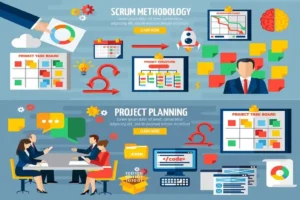The Unspoken Rules Of Coding For Both Novice And Sage Developers
Coding, at its core, is about solving problems and crafting solutions through logic and creativity. Yet beyond syntax and logic lies an entire ecosystem of principles and unwritten rules that shape a developer’s path. These rules aren’t often discussed in textbooks or tutorials but are learned through experience, collaboration, and curiosity. In this guide, we’ll dive into the subtle, often unspoken rules that benefit developers, whether you’re just beginning or have years of experience under your belt.
1. Prioritize Understanding over Memorization
New coders often fall into the trap of trying to memorize syntax or commands. While knowledge of syntax is essential, true mastery comes from understanding how and why code works. Experienced developers focus on the concepts behind the code, as understanding these makes it easier to adapt to different languages or frameworks over time.
For Beginners: Invest time in learning the fundamentals. Grasp what each piece of code accomplishes and how it fits into the bigger picture.
For Experienced Developers: Reinforce your understanding of fundamentals, even as you master advanced concepts. Familiarity with core principles can sometimes offer unexpected insights into solving complex problems.
2. Write Code for Readability, Not Just Functionality
One of the biggest hurdles for beginners is writing code that’s easy to understand. The best code is readable, maintainable, and understandable not only by machines but also by humans—including future and other developers who might look at your code.
For Beginners: Choose clarity over cleverness. Aim to write code that makes sense even without heavy commenting.

For Experienced Developers: Remember that even complex algorithms benefit from clear structure and naming conventions. Readability should always be a priority, no matter how advanced your code becomes.
3. Make Version Control a Habit
A critical part of coding is version control, which allows you to track changes, collaborate smoothly, and even restore previous versions. Experienced developers often use systems like Git religiously, understanding it’s not just a tool, but an essential part of their workflow.
For Beginners: Learn to use Git early on, even for personal projects. Start with basic commands like For Experienced Developers: Maintain detailed commit messages that describe changes clearly. Clear commit logs are essential for tracking down bugs and understanding the evolution of a codebase.
4. Embrace Error Messages as a Learning Tool
Errors are often intimidating to beginners, but seasoned developers know they are crucial learning moments. Error messages contain valuable information—once you know how to interpret them, you gain a valuable skill that turns problems into opportunities for learning.
For Beginners: Don’t just skip over error messages. Study them carefully to understand what went wrong and to prevent future errors.
For Experienced Developers: Even with experience, examine error messages in detail before implementing quick fixes. It’s essential to understand the root cause of errors to avoid introducing more issues.
5. Find a Balance Between Perfection and Progress
Knowing when to stop refining code is an art. While clean, efficient code is the goal, excessive perfectionism can lead to missed deadlines and stalled projects. Knowing when code is “good enough” is crucial for seasoned developers.
For Beginners: Avoid getting bogged down trying to write flawless code initially. Focus on getting it to work, and refine it as you learn more.
For Experienced Developers: Strike a balance between functionality and refinement. Recognize when a solution is “good enough” and move forward to maintain momentum.
6. Refactor Code as You Gain Knowledge
As your skills evolve, so too should your code. Refactoring—revisiting and improving existing code—helps you keep code efficient, readable, and in line with best practices.
For Beginners: Don’t be afraid to go back and revise the code you’ve already written. Refactoring is part of growth and leads to a better understanding of coding principles.
For Experienced Developers: Schedule regular refactoring sessions on long-term projects. This keeps code manageable and prevents issues that might emerge down the line.

7. Learn to Communicate Effectively
Coding isn’t just about the code; it’s about how well you communicate with others about your code. Whether explaining a bug to a teammate or writing documentation for a project, clear communication is a valuable skill.
For Beginners: Practice articulating your code’s purpose and logic. Explaining code helps you understand it better and creates clarity for others who may interact with it.
For Experienced Developers: Use your communication skills to mentor others. Teaching reinforces your knowledge and fosters collaboration and trust within a team.
8. Seek Help, and Share Your Knowledge in Return
The coding community thrives on sharing knowledge. Knowing when to ask for help and offering assistance to others are vital unspoken rules that benefit everyone involved.
For Beginners: Don’t hesitate to ask questions when you’re stuck. Learning from others is part of the journey.
For Experienced Developers: Offer help to those less experienced. Explaining concepts helps solidify your own understanding and builds a stronger community.
9. Avoid Premature Optimization
Optimizing too early can lead to over-complicated code and wasted time. Experienced developers understand that it’s better to make code work correctly first and then improve performance if needed.
For Beginners: Focus on functionality over efficiency at the start. Write code that works first, then optimize if it becomes necessary.
For Experienced Developers: Be mindful of optimization’s role in maintainability. Only optimize where it will make a significant difference.
10. Adopt a Lifelong Learning Mindset
The tech landscape is dynamic, with new languages, frameworks, and tools emerging constantly. Developers who continually learn stay relevant and adaptable, making this a vital unspoken rule in the coding world.
For Beginners: Cultivate a habit of learning. Experiment with new frameworks, explore languages and keep pace with industry changes. the unspoken rules of coding for both novice and sage developers
For Experienced Developers: Keep learning, even if you feel competent in your primary tools. Knowledge of emerging technologies can provide new perspectives and techniques that enhance your work.
11. Respect Testing as Part of the Development Process
Testing is often seen as a separate, sometimes optional step, but it’s essential for writing reliable, bug-free code. Experienced developers know that testing saves time in the long run and improves software quality.
For Beginners: Include basic tests in your projects. Get comfortable with checking your code manually at first, but aim to adopt unit and integration testing as you advance.
For Experienced Developers: Embrace automated testing as much as possible. Automated tests catch issues early and maintain stability over time.
12. Respect Deadlines and Prioritize Your Time
Coding is a creative process, but it’s also bound by deadlines and deliverables. Successful developers respect time constraints without compromising the quality of their work.
For Beginners: Learn to estimate your time on tasks realistically. Set personal deadlines and work steadily to meet them without rushing through important steps.
For Experienced Developers: Manage your time effectively by focusing on what adds the most value. Balancing detail with efficiency is key to meeting deadlines and exceeding expectations.
13. Master the Art of Debugging
Debugging can be frustrating, but it’s a critical skill. Experienced developers use methodical approaches to isolate and resolve issues, making the process faster and more effective.
For Beginners: Approach debugging with patience. Test your code in small sections, print out variable values, and work systematically to find issues.
For Experienced Developers: Refine your debugging techniques with tools and strategies that streamline the process. A structured approach saves time and minimizes frustration.
14. Keep Code Organized with Documentation
Documentation might seem tedious, but it’s essential for keeping code understandable and maintainable. Both beginners and experts benefit from well-organized, clear documentation that explains the purpose and structure of code.
For Beginners: Start with small steps. Write clear comments in your code, and create a basic README file for your projects.
For Experienced Developers: Establish and maintain standards for documentation across projects. High-quality documentation makes projects easier to scale and share.
15. Cultivate Soft Skills alongside Technical Skills
Soft skills—such as patience, adaptability, and teamwork—are equally essential in coding. Coding isn’t always a solo activity, and soft skills often determine how effectively you can work with others.
For Beginners: Develop patience and adaptability, as coding involves a lot of problem-solving. Mistakes will happen, and perseverance will help you succeed.
For Experienced Developers: Maintain a growth mindset and continue developing these skills. Adaptability, humility, and resilience are crucial in an ever-evolving field.
16. Learn from Your Mistakes and Grow
Errors are a part of coding, even for experts. Mistakes offer invaluable lessons and help developers grow when they analyze and learn from them. the unspoken rules of coding for both novice and sage developers
For Beginners: Embrace mistakes as part of the learning process. Each error teaches you something new.
For Experienced Developers: Share your mistakes with others to promote learning and openness. Acknowledging errors fosters a team culture of trust and growth. the unspoken rules of coding for both novice and sage developers
17. Be Consistent with Your Practices
Consistency in coding practices makes codebases manageable and prevents confusion. It allows for smoother collaboration and readability in the long term.
For Beginners: Develop consistent habits in naming conventions, file structure, and code formatting.
For Experienced Developers: Lead by example, especially if working with a team. Set a high standard for consistency to keep projects streamlined. See More New Trend Blogs











